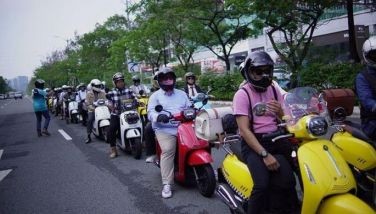Road mishaps from government squabbling
A recent article by STAR columnist Mary Ann Reyes got my head shaking. It was about road accidents and how government interagency squabbling is not only failing to solve the problem, but is actually making it worse. This observation is as infuriating as it is tragically true – not to mention obvious.
In that article, which came out last September 21, Reyes wrote that a private think tank was blaming the lack of a national road safety master plan and non-coordination for the growing number of accidents, and that it has called for the codification of all road traffic laws.
“There is no overall strategy. There is no purposive collaboration. These agencies neither cooperate nor coordinate with each other in implementing their respective plans and programs on road safety,” the article quoted Forensic Law and Policy Strategies Inc., headed by former Justice Secretary Alberto Agra.
The think tank pointed out that local government units (LGUs) and nine government agencies are all involved in ensuring road safety. These are the DPWH, MMDA, LTO, LTFRB, DOTC, PNP-TMG, DILG, DepEd and DOH.
Forensic noted that the achieving traffic safety and developing a national road safety program should start with the Aquino government identifying the agency that would lead these efforts.
According to the think tank, this lead agency could come from one of several government agencies involved in road safety, or be composed of representatives from these bodies and the transport groups, academe, and other concerned sectors.
Forensic suggested that the lead agency should “incorporate road traffic injury prevention into a broad range of related activities, such as the construction and maintenance of road infrastructure, a requirement for roadworthiness of vehicles, law enforcement, urban planning and development, effective driver education, and access to health and hospital services.”
It also emphasized the need for Congress to codify all road traffic laws to avoid overlapping mandates and conflicts in policy and implementation. Ironically, of the almost 40 laws on road safety, only one was intended to identify a national transport strategy, according to Forensic.
The think tank stated that the codication of all road traffic laws should cover classification of roads based on use, determining speed limits, design features, night visibility, access restrictions and area-wide road safety management for each classification, incorporating long-term land use, transport planning and road design, keeping street children and ambulant vendors off the streets, clearing sidewalks of vendors and other obstructions, requiring stronger driver’s licensing control and driver improvement programs, creating networks of segregated pedestrian and bicycle routes connecting to a public transport system, and keeping roadsides clear of trees, boulders, commercial advertisements and other obstructions, especially on roads where vehicles travel at high speeds.
Needless to say, such an all-encompassing undertaking would truly require an inclusive and cooperative relationship among all the agencies involved. No surprise then that, more often than not, chaos rules the streets.
We may have gotten rid of those annoying wang-wangs, but who’s putting a leash on those bullying and traffic law-flouting trucks and buses? Who’s chasing after illegal street racers? Who’s keeping kids and ambulant vendors away from our streets? Who’s even keeping count of the number of motorists who have slammed into a concrete U-turn block because it was poorly placed and even more poorly lighted?
Personally I just feel that the think tank might have overlooked two crucial bodies here: the car and motorcycle manufacturers. They would be in the perfect position to provide technical and technological feedback, most particularly with the very projectiles that fill up our roads everyday.
Still, it’s a very realistic, sensible, and most importantly, doable solution; and one that seems to cover all weaknesses – real and potential – that afflict our road safety today. Of course, mere coordination among the involved agencies, no matter how extensive, is not the final solution. For it to work, the cooperation of all, especially the pasaway bus companies as well as corrupt enforcers and the motorists who corrupt them, is paramount.
The think tank also said that the lack of strategy and coordination among the agencies involved is the reason why the Philippines does not have a reliable database which it can use to develop an effective national road safety program.
Reyes also noted in her article that an Asian Development bank (ADB) study pointed out that this situation has left the Philippines with no choice but to adopt a trial-and-error method in solving traffic problems. Which is also the reason why our traffic situation seems basically dependent on whatever the current MMDA leadership feels will work, be it odd-even scheme, yellow bus lane, UVVRP, U-turn slots, more flyovers, etc, etc...ad nauseum…
The report also singled out the DPWH, PNP-TMG, MMDA and DOH as the only agencies that collect traffic data via their own means and methods – unfortunately with little or no coordination and with no effort at all to consolidate the information gathered.
So who’s gonna start the ball rolling? Mr. President, the ball is in your court…
Here’s a reaction to Ray Butch Gamboa’s rant on tricyccles using our national roads…
Tricycles? They are not the only ones hugging the roads at moderate to high speeds. 2-wheeled motorcycles also hug the roads. Unlike the trikes, when traffic slows down then these motorcycles weave in and out (ala Pacman in the ring) of the traffic. Pag nakasagi, galit pa at tatakbuhan ka pa. – botingting
And one on Kap Aguila’s report on how the LTO’s plans to shift to paper licenses continues to draw fire…
This is highly irregular... Maybe they (the LTO) should focus on ensuring driver education instead. – brondial
- Latest




























